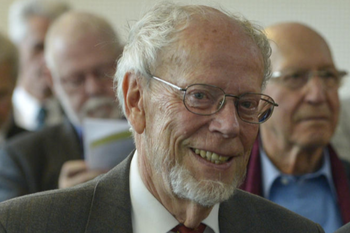Zum Tode von Prof. a.D. Dr. Klaus Möbius
Der Fachbereich Physik trauert um Prof. a.D. Dr. Klaus Möbius.
Er verstarb am 18. Oktober 2024 nach kurzer schwerer Krankheit im Alter von 88 Jahren.
News vom 21.10.2024
Klaus Möbius completed his degree in physics at the Fachbereich Physik at the Freie Universität Berlin in 1962 and began working for the AEG research institutes in Berlin. There, under the supervision of Prof. Richard Honerjäger, he completed his dissertation, which earned him a doctorate from the Fachbereich Physik in 1965. He then returned to the Department as a research associate, and after a research stay at the University of California Riverside with Prof. A.H. Maki, was appointed professor there in 1971. Professor Möbius was a member of the Department beyond his retirement in 2001.
Klaus Möbius was a highly successful researcher in the field of electron spin resonance spectroscopy (ESR) and made a significant impact on this field both in Germany and internationally, particularly with his work on electron nuclear double resonance and high-field ESR. This was reflected in a large number of awards, starting with the Karl Scheel Prize of the Physikalische Gesellschaft zu Berlin for his dissertation and later, e.g., the Philip Morris Research Prize, the Gold Medal of the International ESR Society, and the Zavoisky Prize named after the discoverer of ESR. The high visibility of his research is also reflected in his membership of several international academies, such as the Instituto Veneto di Scienze, Lettere ed Arti and the Academy of Sciences of the Republic of Tatarstan.
In his scientific work, intense collaboration was of great importance to Klaus Möbius. First of all, he interacted closely with his colleagues and friends Prof. Harry Kurreck at the Fachbereich Chemie, Prof. Dietmar Stehlik at the Department, and Prof. Wolfgang Lubitz at Technische Universität Berlin (later Max-Planck-Institut, Mülheim). Together with the first two, he initially developed Freie Universität into an internationally recognized ESR center and subsequently, together with all three, turned Berlin into an outstanding location for ESR spectroscopy. In addition, he built a worldwide network and cultivated close collaborations with scientists from many countries, especially with colleagues from Israel and, even before the opening of the Iron Curtain, with researchers from the former USSR and, later Russia. A prime example for this is his friendship with Prof. Kev Salikhov (Kazan), which was celebrated in a Festschrift dedicated to both of them on the occasion of their 85th birthdays in the journal Applied Magnetic Resonance. In 2006, Klaus Möbius was awarded the Bundesverdienstkreuz 1. Klasse (Order of Merit of the Federal Republic of Germany, 1st class) for establishing these international relationships and his ongoing commitment to maintaining them.
During his time in office, Klaus Möbius held the position of Prodekan and Dekan of Fachbereich Physik for two years. He was very involved in various research networks at Freie Universität, including the Collaborative Research Centers 161 "Hyperfine Interactions", 337 "Energy and Charge Transfer in Molecular Aggregates", and 498 "Protein-Cofactor Interactions in Biological Processes", funded by the Deutsche Forschungsgemeinschaft (German Research Foundation, DFG). Furthermore, he headed the DFG Priority Program 1051 "High-field EPR in Biology, Chemistry and Physics". This nationwide project, which also involved international partners, is an example of his great interest in the broad, interdisciplinary use of ESR spectroscopy. He set an example with his outstanding work on the light-driven primary processes of photosynthesis. By shifting his field of research from questions of molecular physics to biophysics, he made a decisive contribution to the development of one of the current main research areas of the Department.
As an academic teacher, doctoral supervisor and mentor, Klaus Möbius created an excellent environment for his undergraduate students, doctoral students and postdocs with his engaging personality and always showed confidence in their abilities. Many successful scientists have emerged from his research group, including a number of professors, who carry on his enthusiasm for research within the scientific community.
The Department of Physics mourns the loss of a highly esteemed scientist and colleague. Our sympathy goes out to his wife Uta and his daughters Katharina and Janina.
For the Fachbereich Physik
Robert Bittl
Schlagwörter
- Klaus Möbius
- Nachruf
